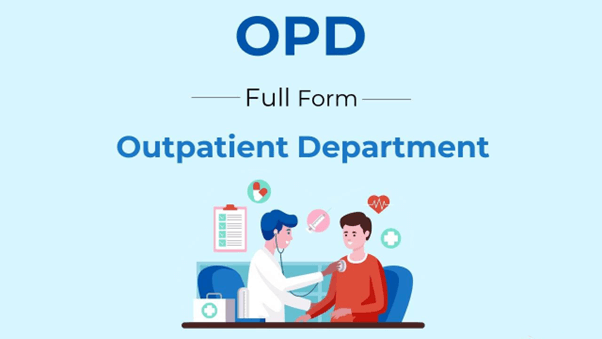OPD stands for the Outpatient Department, which serves as the central hub where patients connect and communicate with healthcare professionals within a medical facility. It’s the place where patients receive medical care without the need for hospitalization, making it the primary avenue for their interactions with medical experts.



Types of Outpatient Departments
- General Medical OPD: Provides routine check-ups and consultations with primary care physicians.
- Speciality Clinics: Focus on specific medical areas like cardiology, orthopaedics, and dermatology.
- Surgical OPD: For consultations with surgeons and surgical assessments.
- Pediatric OPD: Exclusively for children’s healthcare and vaccinations.
- Obstetrics and Gynecology OPD: Specializes in women’s health and maternity care.
- Dental OPD: Offers oral health services and dental procedures.
- Eye Clinic (Ophthalmology OPD): Provides eye care, exams, and vision correction.
- Psychiatric OPD: Offers mental health assessments and therapy.
- Physical Therapy OPD: Focuses on rehabilitation and recovery.
- Cancer OPD (Oncology OPD): Specializes in cancer screenings and treatment.
- HIV/AIDS OPD: Provides care and counselling for HIV/AIDS patients.
- Chronic Disease Management OPD: Focuses on managing conditions like diabetes and hypertension.
- Travel Medicine OPD: Prepares travelers for international trips.
- Orthopedic and Sports Medicine OPD: Deals with musculoskeletal issues and sports injuries.
- Allergy and Immunology OPD: Diagnoses and manages allergies and immune disorders.
Services Offered in an OPD
- Medical Consultations: Patients meet with healthcare providers for assessments and advice.
- Diagnostic Tests: Blood tests, imaging, and ECGs are conducted for diagnosis.
- Prescription Medications: Doctors prescribe medications, available from the OPD pharmacy.
- Vaccinations: Immunizations protect against diseases.
- Minor Procedures: Wound care, sutures, and injections are performed.
- Health Screenings: Preventive tests for diabetes, hypertension, etc.
- Specialist Consultations: Appointments with specialists for specific health concerns.
- Physical Therapy: Rehabilitation for injury or surgery recovery.
- Mental Health Services: Psychiatric and therapy sessions for mental health.
- Maternity Services: Prenatal care, family planning, and women’s health.
- Cancer Care: Cancer screenings, treatment, and oncology consultations.
- Chronic Disease Management: Services for conditions like diabetes and asthma.
- Dental Care: Dental exams, cleanings, fillings, and extractions.
- Eye Care: Eye exams, vision correction, and treatment for eye conditions.
Difference between outpatient and inpatient
Outpatient Care:
- Short visits, no overnight stay.
- Typically in clinics or specialized centers.
- Less intensive care for less severe conditions.
- Lower cost, no hospitalization fees.
- Examples: doctor’s visits, tests, vaccinations.
- Often covered by insurance with lower costs.
Inpatient Care:
- Extended stays in a hospital.
- Continuous monitoring and specialized care.
- Higher cost due to hospitalization.
- Examples: surgeries, severe illnesses, childbirth.
- Covered by insurance with potential higher expenses.
Benefits of Using Outpatient Services
Utilizing outpatient services in healthcare provides a range of benefits for both patients and healthcare systems. One of the primary advantages is cost-effectiveness; outpatient care is generally more affordable than inpatient care, making it an economical choice for patients. Additionally, outpatient services offer greater convenience, allowing individuals to schedule appointments that fit their daily routines, resulting in minimal disruptions to their lives.
Shorter wait times for appointments are another advantage, ensuring that patients receive timely care. Furthermore, outpatient facilities typically have lower infection risks compared to hospitals, as the duration of exposure to other patients and healthcare environments is shorter. The freedom to return home after receiving care contributes to a more comfortable and potentially faster recovery process.
Conclusion
In conclusion, the Outpatient Department (OPD) plays a vital role in the healthcare system by offering a wide range of medical services to patients who do not require hospitalization. OPDs provide convenient, cost-effective, and patient-focused care, allowing individuals to access timely medical consultations, treatments, and diagnostic services while maintaining the flexibility to return home after their appointments.
These departments cater to various healthcare needs, from routine check-ups and vaccinations to specialized consultations with specialists and chronic disease management. The benefits of OPDs extend to reduced healthcare costs, shorter wait times, reduced infection risks, and greater patient autonomy.
Frequently Asked Question
OPDs provide a wide range of services, including medical consultations, diagnostic tests, vaccinations, specialist consultations, minor procedures, and more, depending on the facility’s capabilities.
To schedule an appointment, you can usually call the healthcare facility directly, visit their website for online booking, or use their designated appointment booking system.
Outpatient care is often covered by health insurance plans. However, coverage can vary, so it’s essential to check with your insurance provider regarding specific services and expenses.






